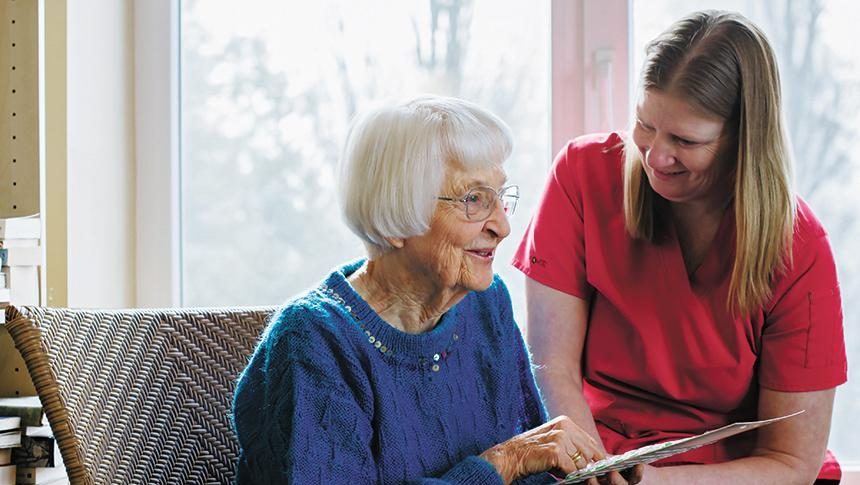Feature image: Brenda Klassen, a health-care assistant, helps Carolyn Grove-Seely, a resident of Menno Place. (Photo by Rebekah Bielefeld)
The head of a Columbia Bible College diploma program is seeking to prove the value of health-care assistants and help raise up a new generation of them in B.C.
The eight-month program is starting this month and is provincially recognized. According to the Abbotsford college, it will follow an approved curriculum for training and will integrate a Christian perspective.
Trish Giesbrecht, the program director, said Columbia is aiming to meet a need in the province. The current demographic of health-care assistants in the province is aging. They are in their 50s and will be seeking retirement soon.
“They are going to be aging out of this role and we don’t have people coming in to pick up the torch and carry on,” she says.
Part of that is because people don’t really know what a health-care assistant or care aide is. “They are the people who do the hands-on care for patients and residents, and they often will work in hospital settings, in home support, in care homes, assisted living and group homes,” she explains.
It is also due to the fact that people don’t respect care aides as much as they do doctors and nurses.
“It’s been a vocation that hasn’t received honour,” Giesbrecht says. “There’s a lot of negative publicity and it needs people to reclaim the value and the virtues of this particular role. We devalue this particular vocation, and it shouldn’t be, because it’s such an integral part of caring for people.”
Part of the new program is a mandatory class called Foundations of Christian Vocation. Through the class, instructors will give students the tools to connect their Christian faith with their work.
“In this program we’re not only going to teach students to bathe patients, feed them and dress them, but also how to connect with people on a deeper level, too,” Giesbrecht says.
Eun Hei has always wanted to work for people in need, which is why she applied to be in the program. “I am hoping to learn how to serve and comfort people with Jesus’ heart through this program,” she says. “I am hoping to grow spiritually, so that when I work, I please people and God.”
Katherine Klassen is another prospective student. She decided that she only wanted to study at Columbia. “I applied to this specific program and not any other programs because I felt that my faith was essential in choosing this career, that it was important to include my Christian values in my studies, and this is what this program provides,” she says.
She hopes to promote the value of health-care assistants as well as advocate for the value of older adults. “By shifting the mindset of society from stigmatizing our older adults, to people that are worth respect and to be valued, we are able to learn from the past, and older adults are able to find purpose in their older age,” she says.
Abbotsford’s Menno Place, a member of the Mennonite Benevolent Society, is part of the program’s advisory committee, along with Tabor Village, a Mennonite Brethren-owned organization, and Baptist Housing.
Menno Place is also providing a dedicated laboratory space on its campus where Columbia students will gain hands-on skills.
Karen Baillie, the chief executive officer of Menno Place, says it is involved in the program because of a lack of health-care aides in the province. “In 2019, long-term care, assisted living, and home health-care providers are facing an alarming . . . human resources crisis,” she says.
Baillie thinks the involvement fits with Menno Place’s mandate and will help in “the development of future employees who exhibit our values.”
Giesbrecht adds that she thinks this program is an important one for a Christian college. “I just feel we’re called to be the hands and feet of Jesus,” she says. “This is that in a practical way.”
To learn more about the program and apply to be in the 2020 class, visit columbiabc.edu/aca/health-care-assistant.
The article was originally published in Canadian Mennonite.




